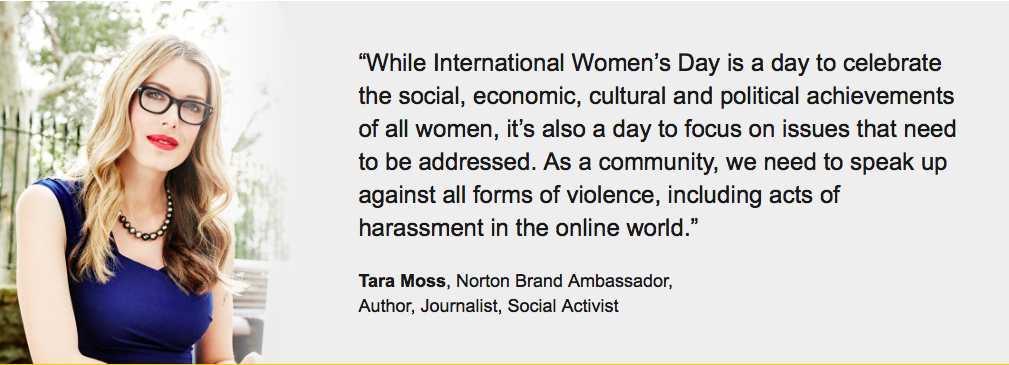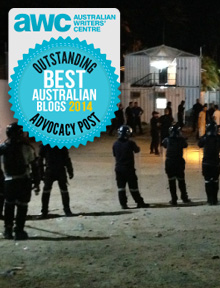‘This abuse, it must be stressed, is not a matter of free speech. It is a matter of public safety and law. Threats of death, rape or other physical harm are illegal online, just as they are offline. Likewise, it is against the law to encourage a person to harm themselves.’
Last year, after being announced as patron for the Full Stop Foundation for ending rape and domestic violence I saw a spike in online threats. ‘rape the b*tch again’ one man wrote to me, adding ‘cuff yourself to deep water’. His Twitter feed was filled with disturbing comments and images, including violent porn, photographs of women with their mouths being covered by men’s hands, pictures of high profile women with the word ‘rape’ and an image of US news anchor Megyn Kelly’s face photoshopped onto a naked woman engaged in sex. I reported him to Twitter, who then explained that they’d contacted him and asked him to ‘discontinue this behavior’ (something which led to further abuse, of course), and the onus was on me to report him again if he continued to be abusive. In order to do that, of course, I’d have to unblock him, expose myself to more of his abuse and record it.
I did. It took further communications over 4 days, with yet more screen shots and URLs as evidence, to point out what should have been obvious in the first place – he was clearly using Twitter for abusive purposes, against their stated terms and conditions. As I wrote to them, ‘I hope you will agree that allowing a user to continue in this way makes a mockery of Twitter’s rules and new complaint procedures.’ His account was finally suspended.
This was just one abusive person, but where do you draw the line? I knew he was doing this to other women, I could see it. By doing nothing, and by having the social media platform do nothing except ask him to ‘discontinue this behavior’, without seeing if he actually did, we would be condoning his abuse.
Once, when I was on a panel with Germaine Greer, she commented that if you go on Twitter, ‘you get what you deserve.’ There was great laughter, and though it was one of Greer’s famously provocative throwaway lines, the problem is, too many people actually believe that online abuse – on Twitter, Facebook, Reddit, Instagram, wherever – is a normal fact of life and if you go online you should expect it, you have ‘signed up for it’ even. We have normalised online abuse, and in doing so, many of us have decided that nothing can be done. This idea has disturbing shades of the more toxic beliefs about offline abuse – women just get hit. Gays just get bashed. That’s life. Besides, that’s what they get for being female, being gay, being online…
But this is only the Internet, right? Why does it matter? Because the Internet is without question a significant part of the lives of most Australians. These abusive messages are sent and received by real human beings. 90% of women say they are online for at least one hour every day, usually many more. Even 40% of women over the age of 60 now report spending at least 3 hours online. On International Women’s Day, when we celebrate women’s social, economic, cultural and political achievements, we also have to recognise the problems women are still facing, including what they are experiencing online, and how it is connected to, or impacting, their offline lives.
A new survey by the Internet security company Norton, Online Harassment: the Australian Woman’s Experience, shows that nearly half of all Australian women (47%) experience online harassment. That rises to a staggering 76% for women under 30. Unsurprisingly, 70% of women believe online harassment and abuse is a significant problem and 60% believe it has got worse since last year. Forms of online harassment range from unwanted contact, trolling, character assassinations and cyberbullying to sexual harassment and threats of physical violence, rape and death. Shockingly, the survey revealed that one in 10 women under 30 had experienced revenge porn and/or sextortion, both extreme forms of bullying, and also crimes.
As a writer and human rights advocate it is not uncommon for me to receive online threats in an average month, and this is basically guaranteed after a high profile talk, appearance, or published opinion piece. I’m not alone in this. The Norton survey showed that, on average, 1 in every 6 women under thirty get online death threats, and more than a quarter of young women online get threats of physical violence.
This abuse, it must be stressed, is not a matter of free speech. It is a matter of public safety and law. Threats of death, rape or other physical harm are illegal online, just as they are offline. Likewise, it is against the law to encourage a person to harm themselves. Though these types of threats do not always get reported, or when reported do not always result in adequate support, it is against the law and perpetrators have been jailed for these crimes. It is never okay. We must stand up to it.
The Norton survey reveals not only the extent of the problem, but the significant emotional toll this online abuse takes on Australian women. Almost one in 10 women needed to seek professional help for depression or anxiety. Some 5% of women felt suicidal. Yet only 10 percent of Australian women report perpetrators of the online harassment to police.This may relate to the fact that more than one in 10 women in the survey (14%) reported feeling ‘powerless’ about their experience, and over half (56%) felt better online security measures were needed, and the police and authorities needed to start taking victims more seriously (58%). As a community we need to do more to acknowledge the real effects of online abuse and take a firm stand against it, and as with offline abuse, we need to make reporting safer and easier.
It isn’t enough to say it’s what they deserve. No one deserves abuse. Ever.
– Tara Moss is a writer, human rights advocate and Norton Ambassador. She helped design the survey into online abuse, conducted in February 2016.
– Parts of this blog first appeared in Sunday Life magazine.
– Photograph at top of page by Toby Dixon for The Australian.






Dear Tara,
I wish to send a comment on this article but don’t want it published as it contains sensitive information. Please let me know if it is possible to do so.
Warm regards
Jennene
Dear Jennene,
My contact page is here: https://www.taramoss.com/contact/ if that is of any assistance. Best wishes, Tara
Thank you for this excellent article.
This is an important message that we must continue to push.
Any speech which removes or diminishes the freedom and safety of others cannot be considered free speech. If you choose to use words which abuse threaten or vilify, this is the speech of oppression and it erodes the freedom of those who use it as well as those it is directed to.
The answer to this is simple but hard. We cannot give up our right to exist in the online world and we must all fight for a right to exist safely there.
We are the customers of Twitter and Facebook and if we maintain a strong message that their safety and abuse policies are poor and badly enforced they will have to listen. Eventually.
fabulous post. I would like to say online threats is harmful for human rights.Tara Moss told the right thing about online threats. Government should take step hardly to protect human rights.
You are the strength that so many cannot find.
I have just sent you confidential email to hmm@harrymmiller.com, and would appreciate your perusal.
It lifted me today, to hear about you speaking up and then listening to you speak on Q & A – I have resorted to very harsh words, while including humour, after three years of almost daily harassment/abuse/threats/vandalism, but you outlined exactly what the problem is and the excuses used by all who would dismiss victims and/or cover for abusers.
wishing you lots of brightness as you acknowledge/tackle the difficulties of others.